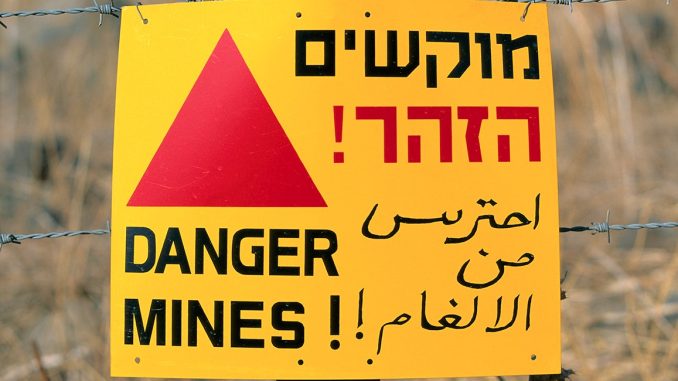
The recent decision by the Biden administration to drop anti-personnel landmines from the U.S. arsenal was a serious mistake. It will not save lives. Indeed, it will likely cost lives—both of U.S. military personnel and of the civilians our military seeks to protect. But there are aspects of U.S. landmine policy that work well. Foremost among these is the support the U.S. provides to foreign countries for removing deployed landmines and destroying unexploded ordnance.
Since 1993, the U.S. has spent $4.2 billion on destroying conventional weapons in other countries.
This aid is not about being charitable. It’s partly a legal obligation—when the U.S. drops bombs or fires shells, it’s supposed to clean up afterwards. But it’s also an inexpensive way of winning goodwill—and for an average of $250 million a year, the U.S. gets the opportunity to talk with, and build relationships with, a lot of national leaders and foreign armed forces.
Virtually every country in the world has unexploded ordnance lying around—even the U.S. still finds duds left over from the Civil War in Virginia. But some countries have a lot of it. In just five days in August, for example, Azerbaijan found and defused 504 mines and other leftover ammo in a 2-square-mile area.
Much of the U.S. aid is provided by the State Department, which makes grants to civilian deminers. The U.S. Defense Department also helps by providing equipment, airlifts, and training, while the U.S. Agency for International Development gives assistance to victims of conventional weapons.
Cleaning up conventional weapons is a slow, dangerous business. If you want to be sure that an area’s been cleared of all land mines and shells, you have to remove nearly every piece of scrap metal from it. That means checking every metal detector signal—in the knowledge that every beep might be your last.
As with all foreign aid, the best kind of partners are those who want to help themselves. There are lots of places in the world that the U.S. cannot help, either because there’s a war on, or because the local tyrant doesn’t want U.S. help, or because the regime is simply incompetent.
The U.S. spreads its land mine removal dollars around widely. In fiscal year 2021, the U.S. planned to assist 42 countries and to provide another $39 million to global or multi-country efforts. Some of this proposed assistance was obviously a non-starter—the U.S. had hoped to help Afghanistan, but we were not going to give the Taliban $20 million, for example.
Other planned U.S. grants can also be a bit of a head-scratcher. The Democratic Republic of the Congo, for instance, was supposed to get $4 million, but the DRC is subject to endemic corruption, and rebel groups control large parts of the country. It’s not the kind of place we can help effectively. Much the same is true of South Sudan, which was supposed to get $2 million.
You can either aid a lot of places a bit or a few places a lot. There is something to be said for both approaches. But trying to help 42 countries is a big ask, and U.S. aid programs might benefit from a tighter focus on places that want our help, have effective governments, and have decent relations with the U.S.
The example of Azerbaijan is instructive. The U.S. gave its last annual bit of aid to Azerbaijan in 2019 on the grounds that landmine clearance operations were all but completed. Since then, however, Azerbaijan has retaken control of territory formerly occupied by Armenia—territory that is riddled with land mines.
Of course, the U.S. can’t help in Azerbaijan, or elsewhere, unless it’s asked to help. But landmine and unexploded ordnance removal is a relatively inexpensive cause that the U.S. has supported generously. Over the past five years, it’s provided over a third of the total support for demining in the entire world.
It would be nice if the Biden administration recognized that land mines aren’t much different from all other conventional weapons—all of them can be used properly or improperly, and all of them leave dangerous debris that need to be cleaned up afterwards. Giving up on the use of land mines to deter our adversaries only helps regimes like Russia that want to roll across international borders without worrying about being blown up.
In the end, even the best foreign aid program is no substitute for other countries building their own domestic resources through economic freedom. Ultimately, a country needs to be able to pay its own way. Well-designed aid programs can help here and there, but the best destiny for any U.S. aid program is to become unnecessary.
But in the here and now, demining assistance meets a real need. We know how to support it, we can oversee our current aid program effectively, and we get results. It’s one of our most effective aid programs—it’s not politicized and it actually helps people. We might benefit from reviewing our aid to focus it a bit more tightly. But the U.S. has a good thing going with its support for demining.
Have an opinion about this article? To sound off, please email letters@DailySignal.com, and we’ll consider publishing your edited remarks in our regular “We Hear You” feature. Remember to include the URL or headline of the article plus your name and town and/or state.

